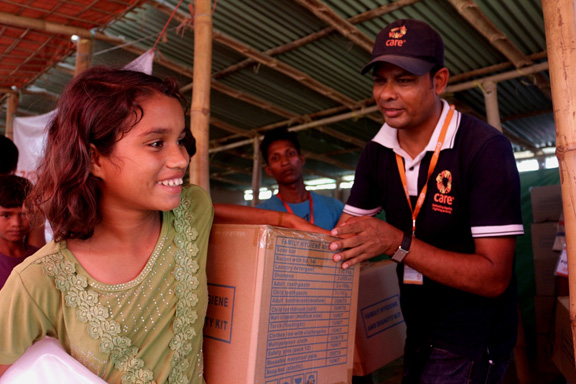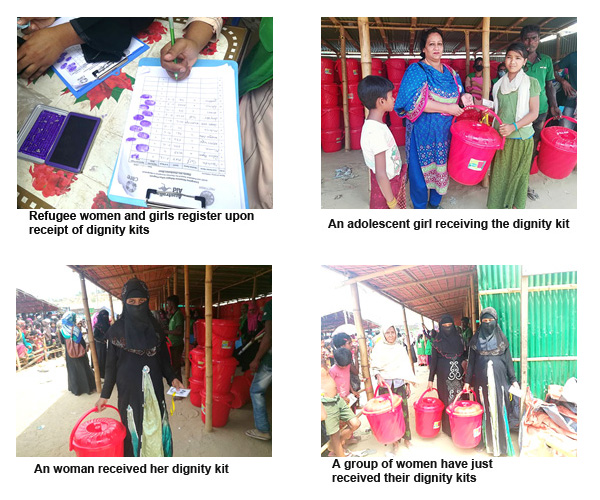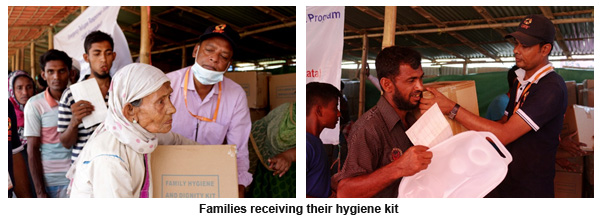
It’s been over six months since the residents of Rakhine State crossed over to Bangladesh in Cox’s Bazar to escape the communal violence in Myanmar. Amidst the rainy seasons of late-monsoon, the refugees spend days under the open sky, only few were able seek refuge with the host communities. At present, 671,000 new refugees are living in different camps in Ukhia Upazila, and estimated another 200,000 were already living in Cox’s Bazar prior to the onset of violence in August 25, 2017.
CARE has been one of the first responders at the crisis site providing cooked food, umbrella and temporary shelter items to absorb their shock and start building settlements. Their temporary settlement was hindered by out-break of water-borne and other hygiene related diseases. Basic health services became a dire need amidst the hundreds and thousands of people who were already suffering from trauma of communal violence, harsh route to exile and shelter-less nights.
One of the many interventions where CARE is providing continuous support to the refugee families is WASH services. To ensure proper health and hygiene among the families, CARE has been distributing dignity and hygiene kits among the refugees in women and the families in Potibunia camp. These dignity and hygiene kits contain items that is necessary to maintain one’s basic hygiene needs. On April 2018, the families received separate hygiene and dignity kits that are customized with items very specific to each groups’ need.
Dignity Kit
In emergency crisis situations, the needs for food, shelter and security are rightly prioritized but the specific needs of women and girls are often overlooked. Maintaining proper hygiene is a common problem in displaced and refugee communities, and the problem is manifold for women and adolescent girls. Such is the reality of the women and girls in the refugee camps at Cox’s Bazar camps. They neither have market access nor the financial ability avail female hygiene products and therefore they are highly prone to sexual and reproductive health (SRH) related problems. CARE is addressing this problem by designing and distributing dignity kits to the women and adolescent girls at Camp 16, Potibunia, under Emergency Response Refugee Influx Program (ERRI) funded by the Department of Foreign Affairs and Trade (DFAT), Australia.
On April 4 – 5, 2018, CARE Bangladesh distributed dignity kits among 2,000 women and adolescent girls at Camp 16, Potibunia. This camp is managed by CARE Bangladesh, where 22,000 people are living. In this camp, CARE is in-charge of coordinating multi-sectoral interventions including shelter, WASH, Protection & GBV. Although the population in Potibunia camp has received hygiene kits before, but from GBV and Protection sector of ERRI program.

Each kit contained essential female care items such as cloth napkin, laundry bar, bucket with lid, underwear, orna, maxi pieces, slipper, torch/solar lantern and thami (a wrap-around garment for women). 1,500 women and 500 adolescent girls from block A, B and C received the dignity kits in this phase.
Julekha (34 years), resident of C-282, block C, Putibonia camp said, “We are very happy for having this dignity kit. Many organizations have distributed many things to us but CARE distributed dignity kits are special for women because dignity kits items have addressed our needs. CARE have supplied this kit along with the awareness program on using instruction. This dignity kits will serve our needs for a limited time and we need such dignity kit materials regularly.”
Young girl, Pormina (14 years), from B-766, block B said “We usually used to walk barefooted for going to the toilet and other unhygienic areas. We also didn’t have not enough menstrual items. This kit will be very helpful for me. Right now we feel more comfortable and believe that dignity kits will reduce our menstrual sickness/disease. We are grateful to CARE and hope that they will continue the dignity kits distribution.”
Hygiene kit
Knowledge of WASH and usage of latrines will only go so far they have access to maintain these habits with. It is very challenging for the refugees to maintain their basic personal hygiene primarily because they do not have access to the markets, and also because most of them are able to afford these commodities. By providing the refugees with the hygiene kits, CARE, with the support from UNICEF, is helping raise awareness about cleanliness while also preventing diseases indirectly.

On April 8-9, the refugees at Camp 16, block A, C and G, Potibunia received hygiene kits for the third time, since their arrival in Cox’s Bazar. Each of these kits consisted of 2 soap bars, 3 shampoos, 2 adult toothpaste, 3 children’s toothpaste, multi-purpose clothes, safety-pins cloth line with cloth-pins, nail cutter/clipper, torch light, 2 adult tooth brush, 3 children’s tooth brush, reusable mensural pads and a soap box. 3,000 households (HHs) received these kits where 7,143 male and 7,165 female received the items.
For many of the recipients, it is the first time they are receiving healthcare items like toothpaste and shampoo, “Some of us did not know how to use shampoo but now we are aware of from display, campaign and health promotion (HP) sessions”, said one beneficiary, while another elderly woman said, “we used ash for brushing before, now we use toothpaste”. In general, by now, most of the families are well aware of the hygiene kits, its usage and acknowledges that it helps stay clean and free of diseases.